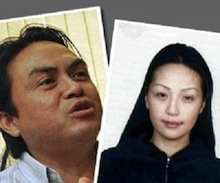‘Sirul had no control of C4 explosives’

“There were no C4 explosives kept in the store of the Special Action Unit. They (Sirul and another accused) were not trained to handle explosives and bombs. Bombs are strictly controlled in a police store,” he said.
(Bernama) – The High Court judge erred in convicting two former Special Action Unit (UTK) personnel for the murder of Mongolian woman Altantuya Shaariibuu, the Court of Appeal here heard today.
Lawyer Hazman Ahmad said his client Azilah Hadri, 34, did not have possession and control of the C4 explosives allegedly used in the woman’s murder.
“There were no C4 explosives kept in the store of the Special Action Unit. They (Sirul and another accused) were not trained to handle explosives and bombs. Bombs are strictly controlled in a police store,” he said.
He said Azilah’s log record showed that he was only issued a Glock pistol and magazines.
Evidence during the trial disclosed that Altantuya was shot and her body blown-up with explosives at a jungle clearing on the night of Oct 19, 2006.
Hazman submitted that there were inconsistencies in the prosecution witnesses’ evidence with regard to the alleged information given by Azilah which led to the discovery of the crime scene.
He said Azilah had never disclosed the location of Puncak Alam where Altantuya was shot and blown up, adding that there was a miscarriage of justice against Azilah as police had prior knowledge of the location.
“There were serious contradictions in the evidence of prosecution witnesses of what Azilah had said,” said Hazman, who was submitting in the appeal of Azilah and Sirul Azhar Umar, 39, against a High Court’s decision in 2009 to convict and sentence them to death for killing Altantuya, 28.
They committed the offence at Mukim Bukit Raja in Klang near here between 10pm on Oct 19, 2006 and 1am on Oct 20, 2006.
Former political analyst Abdul Razak Baginda, 50, who was charged with abetting them, was acquitted by the High Court on Oct 31, 2008 without defence being called after the prosecution failed to establish a prima facie case against him.
Rigorous cross-examined
Hazman said the trial judge erred in law and facts in admitting as evidence information given by Azilah under Section 27 of the Evidence Act and urged the Court of Appeal to exclude the information.
Hazman said Azilah gave sworn evidence and was rigorously cross-examined by the prosecution but the judge dismissed his defence of alibi as bare denial.
Meanwhile, Sirul Azhar’s counsel Kamarul Hisham Kamaruddin said the failure by the prosecution to call Deputy Supt Musa Safri to testify in the trial constituted a mistrial.
He said only Musa could verify the veracity of the affidavit filed by Abdul Razak which was accepted by the High Court, which subsequently acquitted him (Abdul Razak).
“There are parts of the affidavit which are prejudicial to the accused, he said, adding that the defence had been denied the only way to challenge the affidavit.
He added that the prosecution did not appeal against Abdul Razak’s acquittal.
Kamarul Hisham said Abdul Razak’s phone records showed more than 30 text messages that the political analyst sent to Musa between Oct 7 and 19, 2006, of which 12 were recorded on Oct 19, 2006, the night Altantuya was murdered.
He also submitted before the three-member panel led by Justice Mohamed Apandi Ali that the judgment of Shah Alam High Court judge Mohd Zaki Md Yassin did not state any motive for the murder.
The other two judges were Linton Albert and Tengku Maimun Tuan Mat.
Adverse publicity
Kamarul Hisham also argued that Sirul Azhar were exposed to “adverse publicity” during the trial through three statutory declarations and also a copy of a cautioned statement believed to be Sirul Azhar’s which was uploaded in internet websites, occassioning a mistrial.
However, Justice Apandi retorted, asking where in the judgment did the judge indicate that he was influenced.
He said it was not possible for judges in general to be influenced by media reports as they would not have time to visit websites in view of their workload.
“If this argument is allowed, then all criminal trials, would be a mistrial,” said Justice Apandi, adding that judges acted on facts and evidence adduced in the trial.
The prosecution led by Solicitor-General II Tun Abdul Majid Tun Hamzah will submit tomorrow.

